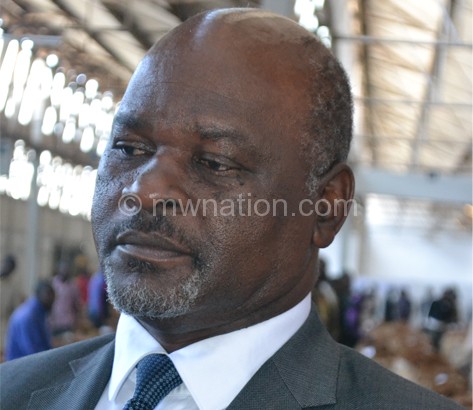Dark-fired tobacco not solution
Government last week announced that it will scale up production of dark-fired tobacco in the country.
Minister of Agriculture, Irrigation and Water Development Allan Chiyembekeza said government is planning to boost the production and quality of dark-fired tobacco because is on high demand on the international market.
The minister was speaking when he visited Mtowe Tobacco Farmers Club in Nsanje.

“Having noted that there are farmers who are growing this type of tobacco in the country, we took pride to come and visit them [farmers] to encourage them and appreciate what they are doing.
“We are impressed with the efforts that these growers are investing in this type of tobacco and we will do everything possible to boost their yields,” he said.
Chiyembekeza said government has already identified a buyer, Premium Tama, to buy the tobacco at fair prices and will provide good seeds to such farmers.
Government said majority of smokers look for nicotine in tobacco, and dark-fired or chingambwe as it is locally known, ‘has a nicotine level of between eight and 15 percent; hence, it will be used to blend with low-nicotine tobacco to upgrade the levels in the low-nicotine leaf.’

is high demand
Government wants to bring a formal and stable market for the leaf to motivate farmers to produce more as they have a ready market.
While industry players agree that dark-fired is a type of tobacco rich in nicotine levels and fetches relatively better prices than burley and flue-cured tobacco, the leaf is also subjected to laws of supply and demand.
Gerald Siwombo, an agribusiness expert based in Lilongwe, said on Tuesday growers often respond to better prices offered in the previous season, with increased production the following season.
Said Siwombo: “And if the prices are low in one season then a decline in volume follows the next season. That is why boosting dark-fired tobacco will be a big mistake.”
The analyst said in most of the years where dark-fired tobacco production is below three million kilogrammes [kgs], prices were above $2.
“It is, therefore, prudent to look at the trend over the years, analyse it, make inferences and come up with informed projections and decisions on the same,” Siwombo argued.
According to data from Tobacco Control Commission (TCC), there was a decrease in volume of dark-fired tobacco from 2009 to 2010 causing prices to increase due to higher demand.
Better prices were registered in 2010 at an average of $2.56, were followed by increased production levels with volumes almost five million kgs in 2011.
With such a colossal supply in 2011, prices went as low as $1.54, TCC data shows.
But as expected, volumes in 2012 dropped as most growers were put off by the preceding season’s prices. This low supply led to better prices averaging $2.09 that year.
The analyst said Malawi saw a similar price pattern for dark-fired tobacco in 2013, when there was increased supply and lower prices.
“In 2014 was a year Malawi held tripartite elections, hence different factors contributed to the mixed supply-demand-price matrix. 2014’s low prices influenced low production levels this year [2015], thus the high prices. This data is likely not to change much with less than a month until the auction floors shut down,” Siwombo explained.
With the above trends, he suggested that volume is likely to increase in 2016 owing to these better prices.
“Should volume be more than what the buying companies want, prices are expected to drop. Should government really be advocating increased production of dark-fired tobacco?
“I think government should be telling farmers projected 2016 demanded volumes of dark-fired and the other types so as to control supply. This will ensure that we are producing within the demanded volumes; hence our bargaining power for better prices will be legitimate,” he said. n





